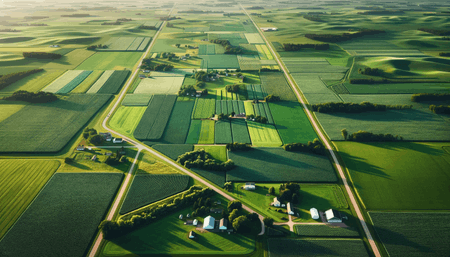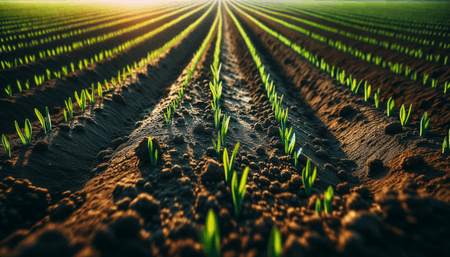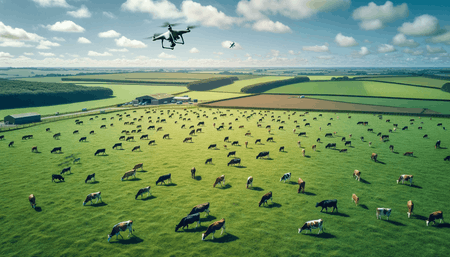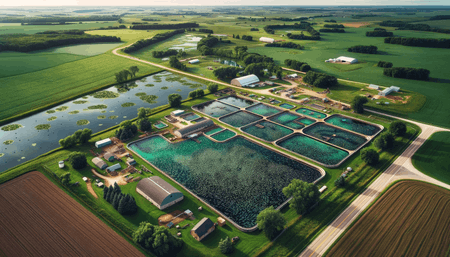Agricultural Preservation
The need for a harmonious balance between agricultural efficiency, the environment, and the health of consumers has become a central issue of our time. This initiative aims to preserve farms and farmland dedicated to growing non-GMO food by supporting farmers and acquisition of at-risk farmland. It leverages scientific advancements to enhance agricultural productivity without compromising consumer health.
As the sun breaks over the vast, undulating fields of America's heartland, a profound truth becomes increasingly evident: the necessity of keeping farmland in the hands of those who till it, the farmers. Farmland ownership is not merely a matter of economic interest or rural heritage; it's a keystone in ensuring America's future food security. At the heart of this lies a simple yet compelling rationale: active landowners, those intimately connected with the soil, have a strong incentive to improve and sustain their underlying asset.
This land, with its rich, fertile soil, has long been the backbone of American agriculture, feeding the nation and beyond; yet the relationship between the land and its stewards is at a critical juncture. The challenges are multifaceted – from the encroachment of urban development to the financial pressures that force many farmers to sell their ancestral lands. Moreover, the rising trend of farmland being acquired by investors and corporations has sparked concerns about the long-term implications for agricultural sustainability and local farming communities.
The intrinsic value of farmer-owned land extends beyond mere productivity. These custodians of the earth bring generations of knowledge, a deep understanding of the local ecosystems, and a commitment to the stewardship of their land. Their practices are often a blend of tradition and innovation, nurturing the land to yield bountiful harvests while preserving it for future generations. This symbiotic relationship between farmer and farmland is crucial in maintaining ecological balance and biodiversity.
Moreover, farmer-owned land is pivotal in local economies, supporting rural communities and preserving a way of life that has defined large swathes of America for centuries. These communities, with their deep-rooted connections to the land, play an essential role in preserving rural culture and traditions.
As the world grapples with the pressing issues of climate change and sustainable food production, the importance of keeping farmland in the hands of farmers cannot be overstated. It is a matter of environmental stewardship, economic resilience, and preserving a legacy. The preservation of this land – and its careful tending by those who know it best – is not just about food security; it's about nurturing a relationship with the land that remains vital to the soul of a nation.

Protecting American Farmland
In the sprawling tapestry of America's rural landscapes, farmland ownership transcends economic interests and rural heritage, emerging as a crucial pillar for the nation's future food security. This land, rich in history and nurtured by generations, represents more than soil and crop; it's a bastion of sustainability, a guardian of biodiversity, and a reservoir of knowledge, pivotal in steering the course towards a robust and resilient agricultural future for America and its people.

Harmonizing Traditional and Modern Agricultural Methodologies
As the world progresses, the imperative lies in harmonizing traditional and modern agricultural methodologies. This integrative approach is key to achieving food security while safeguarding environmental sustainability and promoting human health. Embracing the wisdom of age-old farming practices alongside the innovations of modern agriculture can create a balanced, sustainable food system. Such a synergy ensures that we meet today's needs without compromising the ability of future generations to meet their own.

Reevaluation of Traditional Livestock Management
In the realm of livestock farming, the preservation of animals such as cows and goats without the use of antibiotics presents both a challenge and an opportunity in modern agriculture. This approach, centering on the well-being of animals and the health of consumers, requires a reevaluation of traditional livestock management practices and a shift towards more sustainable, holistic methods.

Organic Fish Farming
Fish farming, or aquaculture, is the practice of raising fish in controlled environments for human consumption. The concept of organic fish farming, which promotes the growth of fish in natural, eco-friendly conditions, is gaining traction as a sustainable alternative to traditional aquaculture and overfishing. This practice aims to create a balance between meeting the growing demand for seafood and preserving environmental integrity.
